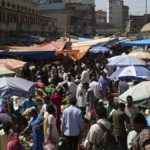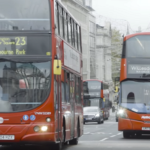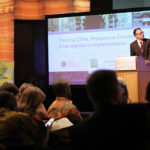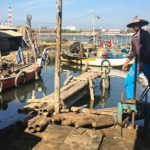Search Results
This series, supported by the Volvo Research and Educational Foundations, discusses walking and cycling in cities with a special focus on low- and middle-income countries. Walking and cycling are the dominant modes of transport in African cities, and too often it’s ...

“We need to get where climate policy is in urban policy,” said WRI Ross Center Global Director Ani Dasgupta in an interview with Urbanet. Speaking at the World Urban Forum last month, he noted that cities are vitally important ...

Autonomous vehicles (AVs) are already being tested in California, Pittsburgh, Singapore, Paris and Oslo. As they spread, they are becoming a natural flashpoint for debate. Proponents of AVs point to their promise of a safer, faster, cleaner and more convenient ...

What happens when 22,000 urbanists descend on your city for the biannual World Urban Forum? We present, we dialogue, we attend high-level sessions, side events, training events, and networking events. Maybe most importantly, we benefit from the open exchange of ...

To keep pace with a rapidly growing population, Bengaluru is making huge investments in transportation infrastructure. One of the city’s newest metro stations, Krishna Rajendra Market Station, is a vibrant case study of how urban development can affect different communities. ...

WRI Ross Center sat down with Mobike CEO Davis Wang at Transforming Transportation 2018 to talk about Mobike’s explosive global growth, next steps for more integrated urban mobility, and the company’s place in the crowded and growing global transport sector. ...

Cape Town is running out of water. After three years of intense drought, South Africa’s second-largest city is just a few months away from “Day Zero,” the day when the city government will shut off water taps for most homes and businesses. The impacts ...

Mobility is undergoing a huge shift – from the emergence of shared cars and bicycles to the impending self-driving cars – and we’re just starting to understand the full effect on cities. The revolution has implications for equity, accessibility and sustainability, and has ...

As today’s urban areas house more than half the world’s population and produce more than 80 percent of global economic activity, cities are uniquely positioned to deliver sustainable solutions. However, poor local air quality and issues related to global climate change ...

Cities are essential to achieve not only the New Urban Agenda, an unprecedented statement of intent by 167 countries more than a year ago in Quito, but the Sustainable Development Goals and Paris Agreement, said a series of urban policymakers, ...

Bike sharing systems in busy urban cores are not new. The first major breakthrough started 20 years ago with the so-called “third generation” of bike sharing systems introducing the use of smart cards to unlock and rent bikes. Today, bike ...

India’s urban transport sector has seen tremendous change in the last 15 years. This series examines the evolution of the for-hire vehicles sector (FHVs), the regulatory response to it and its place in the mobility network of the future. While ...

With the new year just starting, urban decision-makers are planning their 2018 to-do lists, and resilience is the perfect place to start. In 2017, natural disasters stole the show, flooding the headlines and trending on social media. More than 40 ...

One of the biggest challenges to climate action is not only understanding the risks of flooding, extreme heat and other challenges, but how your community might respond to these risks. What are its strengths? How might policymakers augment existing capacities ...

In April, Piyush Goyal, the power minister at the time, claimed that India would introduce electric vehicles with such vigor that by 2030, there would be no petrol or diesel vehicle left to register. The following month, the Niti Aayog ...

Page 44 of 228« First...1020...434445...5060...Last »
 Phil
Great article! A lot of what I have read here, has already been implemented in cities in the Netherlands, with Denmark the two bicycle countries par...
Phil
Great article! A lot of what I have read here, has already been implemented in cities in the Netherlands, with Denmark the two bicycle countries par...
 Bobby Salvin
I understand why some people wish mobility and GDP weren't connected, but it's wishful thinking. During the pandemic, for instance, when the economy...
Bobby Salvin
I understand why some people wish mobility and GDP weren't connected, but it's wishful thinking. During the pandemic, for instance, when the economy...
 Peace
Let me understand your Position -
We need to make our streets and public spaces dangerous and inhospitable so the disabled and infirm are forced to...
Peace
Let me understand your Position -
We need to make our streets and public spaces dangerous and inhospitable so the disabled and infirm are forced to...





















